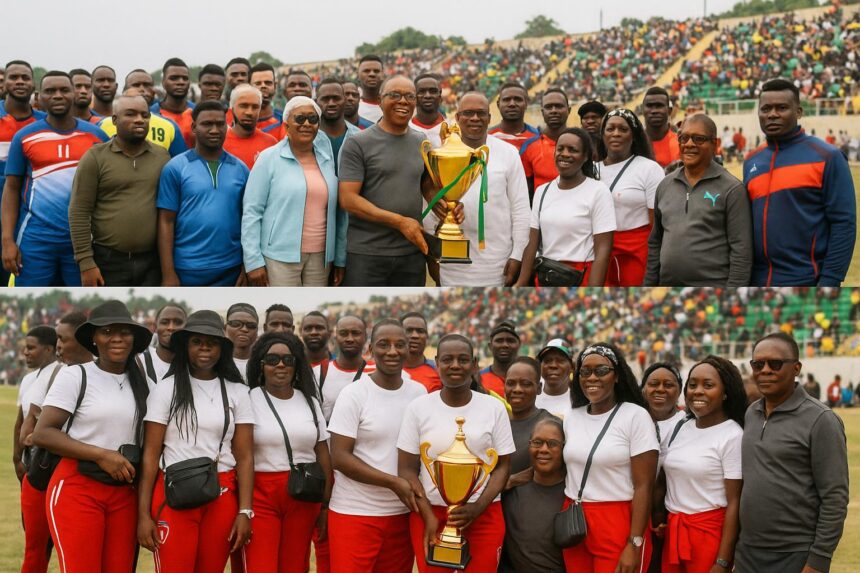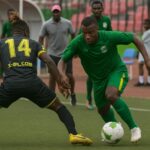Eleven Days That Captivated Madingou
From 8 to 18 September 2025, the usually tranquil Stade Omnisport of Madingou pulsed with whistles, drums and vuvuzelas. Twenty-three senior teams, travelling from Brazzaville, Pointe-Noire, Pool and host Bouenza, fought for bragging rights in the maiden “I Love Bouenza, Literally” handball tournament (Les Dépêches de Brazzaville, 19 Sept. 2025).
The competition, created to animate school holidays and showcase local talent, quickly grew into a barometer of Congolese handball health. Crowds averaged 3 000 per evening, vendors sold out of roasted corn, and radio call-ins dissected every feint and save, confirming the sport’s broad appeal beyond the big cities.
Organisers deliberately mixed men’s and women’s fixtures on the same bill. According to tournament coordinator Col. Christelle Colombe Bouaka Milandou, the format “lets families cheer for both sons and daughters in one trip,” a choice widely applauded by parents interviewed on site.
Final Night Thrills and Tight Scorelines
Fans got the grand finale they dreamed of. The women’s clash paired the disciplined defence of D.G.S.P against the fast breaks of Grain de Sel. Deadlocked at halftime, D.G.S.P shifted gears late, earning a 29-25 victory and the first women’s crown of the new competition.
Moments later, B.M.C and J.S.O served an equally dramatic men’s showdown. A last-minute block by B.M.C goalkeeper Tony Mavoungou preserved a 25-23 lead, sparking a green-and-white pitch invasion. “We stayed calm, trusted our drills, and history opened its door,” the keeper beamed.”
Prizes, Records and Sporting Values
Each winning squad lifted a gleaming silver cup and pocketed one million CFA francs, funds many players say will bankroll better training gear ahead of the national league. Runners-up U.S Renaissance and Asoc collected smaller cheques but vowed to “come back stronger.”
Beyond scoreboards, fair-play diplomas honoured the two teams with the fewest penalties, an initiative saluted by veteran referee Désiré Mabiala: “Discipline keeps talent alive. Rewarding it in public reinforces that lesson for younger athletes.”
Individual certificates also shone a light on top scorers and standout goalkeepers, encouraging the scouts from Brazzaville clubs seen in the stands to take notes for future recruitment.
Official Praise and Future Promises
Bouenza Prefect Marcel Nganongo, who supervised the tournament, received a surprise honorary trophy for his logistical support. In his closing speech he thanked security services and medical volunteers, declaring the event “a practical answer to the Head of State’s call for modern sports structures”.
He plunged the arena into cheers by announcing talks for a bigger 2026 edition during the next school holidays, hinting at the inclusion of junior categories to widen the talent pipeline. Municipal engineers have already started evaluating lighting upgrades to accommodate possible night matches.
The competition enjoyed strong backing from Brigadier General Serge Oboa, presidential special adviser and president of the multi-sport club D.G.S.P. His presence at several fixtures underscored the strategic weight now given to handball in national sports policy (Radio Congo, 18 Sept. 2025).
Handball as a Catalyst for Local Economy
For Madingou’s small businesses, eleven bustling days felt like a mini-festive season. Hotel manager Alphonsine Tamba reports 95 percent occupancy, double the usual rate. Street food vendor Joël Bissila sold nearly 400 boiled peanut bags nightly, remarking that “sports beat any marketing budget.”
Taxi drivers, often idle after dusk, ran late shifts ferrying spectators from surrounding villages. Regional tourism officer Déborah Nzalé estimates the tournament pumped roughly 30 million CFA francs into the local economy, money circulating among market women, mechanics and phone-card sellers.
The prefecture now positions Bouenza as a sports-friendly destination, citing easy access on National 1 and the charm of nearby Mount Mbé for post-match excursions. A social-media campaign in partnership with the Ministry of Culture and Arts is slated to launch before year-end.
Athletes’ Voices and Community Impact
D.G.S.P captain Prisca Ngatsé credits mixed departmental opposition for sharpening her squad’s resilience. “Facing teams we don’t usually meet exposes weak spots. It’s like compressing two months of learning into two weeks,” she said beside the trophy table.
B.M.C coach Armand Kimbembé, whose team travelled 350 kilometres by bus from Pointe-Noire, highlighted the human side: “Players billeted with host families, creating friendships that will outlive any medal.”
Local youth leader Juste Mabiala noticed a spike in handball sign-ups at the Madingou sports school during the tournament. Parents, inspired by the safe atmosphere, enrolled daughters as well as sons, nudging gender stereotypes further aside.
Next Steps on the Road to 2026
Planning for the second edition begins as medals are polished. Organisers aim to streamline accreditation, enlarge medical teams and explore live-streaming matches to diaspora fans. Talks with telecom partners are underway to secure 4G coverage inside the stadium.
Col. Bouaka Milandou insists, however, that the soul of the event will stay grassroots. “Our charm is intimacy. Even with cameras, we want spectators close enough to hear the squeak of sneakers,” she told journalists during the farewell cocktail.
With champions crowned, investors courted and community pride rekindled, Madingou’s handball experiment proves sport can weave social, economic and cultural threads into a single vibrant tapestry. All eyes now look to next year, where Bouenza hopes to raise the bar—and the decibels—yet again.





















